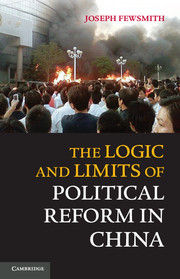Conclusion
Published online by Cambridge University Press: 05 January 2013
Summary
The Chinese Communist Party (CCP) has understood the need for some sort of political reform since the 1980s. Deng Xiaoping gave his well-known speech, “Reform of the Party and State Leadership System,” in August 1980, and thereafter, in the early 1980s the party began regularizing party affairs, including inner-party life and retirement. The topic of political reform was hotly debated in 1986, and the People's Daily reprinted the text of Deng's 1980 speech on July 1, 1987, in anticipation of the Thirteenth Party Congress that would be convened that fall. At the congress, Zhao Ziyang outlined the first effort to systematically separate the party from the government apparatus and to create a civil service. In those years, however, the party's focus on political reform centered on increasing economic efficiency, even though liberal intellectuals spoke hopefully of democracy.
The violent suppression of protesters around Tiananmen Square and elsewhere in 1989 led to a reversal of efforts to separate the party from the state; any party groups that had been removed from government bureaucracies were quickly reintroduced. Nevertheless, the topic of political reform never disappeared entirely, and the collapse of the Soviet Union in 1991 forced the CCP to think about the issue systematically. One result of these deliberations was the enactment of regulations on the selection and appointment of cadres, issued on a trial basis in 1995. These regulations were drawn up under the auspices of Zeng Qinghong, a close protégé of Jiang Zemin, who at the time headed the Central Organization Department. The regulations were based on an understanding that the very closely held power to appoint cadres – as laid out in Chapter 1 of this volume – had led to the personalization of power and corruption. The basic solution, as encompassed in these regulations, was a proposal to involve more people in the selection process, in other words to promote “inner-party democracy.” It is very clear that the Central Organization Department supported such an expansion of inner-party democracy and that Sichuan province responded to this appeal.
- Type
- Chapter
- Information
- The Logic and Limits of Political Reform in China , pp. 170 - 178Publisher: Cambridge University PressPrint publication year: 2013

